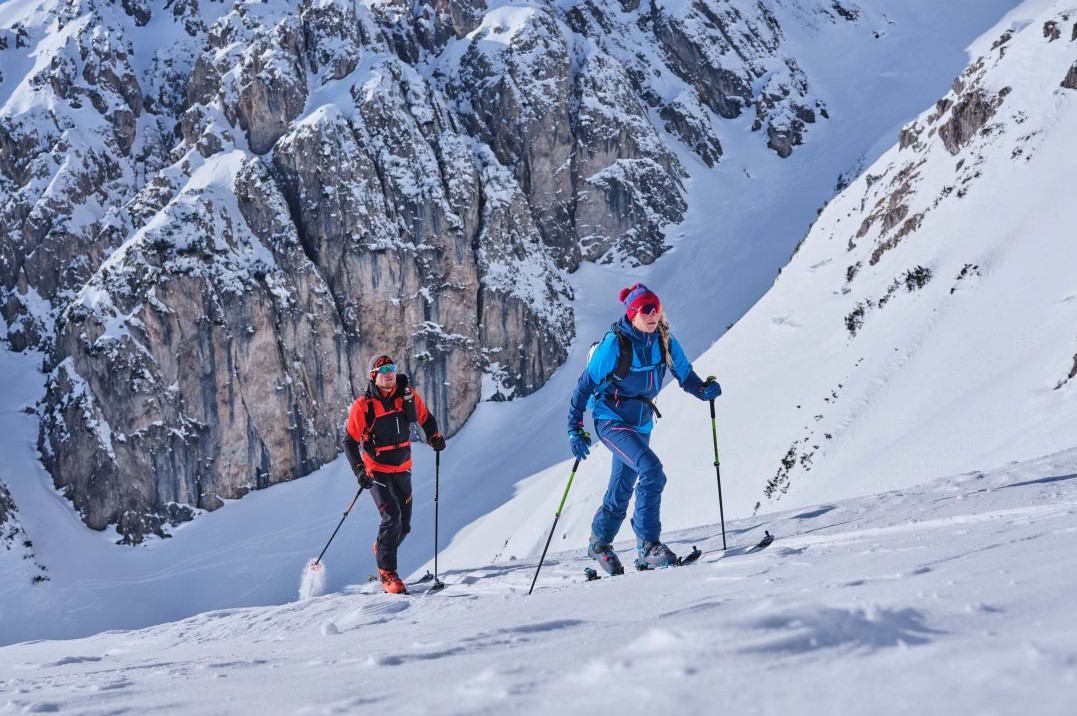PFC-free ski skins, equipment warranties, recycled plastic packaging. These are just some of the ways Oberalp Group and its brands – Salewa, Dynafit, Pomoca, Evolv, and Wild Country – provide sustainable and innovative products.
Recycling, using, and marketing objects created using circular practices are just some of the goals of Oberalp Group – owner of the Salewa, Dynafit, Pomoca, Evolv, and Wild Country brands. These goals are promoted and their progress and results are analysed in the company’s yearly sustainability report. “Every one of us has not just the opportunity, but the duty to take responsibility and act concretely,” says Oberalp CEO Christoph Engl. “For the first time, we have published an easy, practical guide that illustrates how everyone can contribute and reduce their impact on a day-to-day basis.” This guide, known as the Oberalp Handbook, can be downloaded for free from the Group’s website and will soon be available in physical form at Salewa stores.
So, what is Oberalp doing to reduce its ecological footprint?
A Commitment to Sustainability
Since 1981, Oberalp has worked with its brands to develop and manufacture mountaineering gear in ten countries across the world. The Group now counts some 700 employees. Family-run and based in Bolzano, in northern Italy, Oberalp created a sustainability workgroup in 2010. A department focusing on this issue – currently led by Sustainability Manager Alexandra Letts – was founded in 2012. “In our Group, we operate sustainably so that every product, in its specifics, is safe, durable, and guarantees high technical performance,” Letts states. The goal is to integrate sustainability within every one of the Group’s departments and brands through a sustainability strategy divided into two macro-areas: empowering people and engineering gear. In terms of empowerment, Oberalp Group is committed to ensuring safe working conditions and creating solid relationships with partners. The focus of engineering is to create sustainable, innovative products manufactured in a way that gives them the highest quality, safety, and durability by working on circularity, efficiency, and traceability.
Oberalp Group has determined that, as a company, it can contribute to achieving 10 of the United Nations’ 17 Sustainable Development Goals. Foremost among these are: removing of dangerous chemicals from products and manufacturing processes; promoting renewable energy; increasing resource-use efficiency by deploying sustainable industrial processes and incentivising scientific research and innovation; preventing marine pollution; protecting ecosystems. This business model has led an NGO called the Fair Wear Foundation to award the Salewa, Dynafit, and Wild Country brands the status of “leaders” for three years in a row.
But what are the concrete actions that the group carries out to reach the sustainability goals it has set?
Lifetime Warranties and no More PFCs
PFC-free ski skins, lifetime warranties on some products, and the use of recycled plastic to make packaging for certain garments are among the concrete actions that Oberalp has taken through its brands. In terms of ski skins, it should be noted that until the 1930s, skins for ski mountaineering were made using real sealskins. In 2016, Pomoca (the Swiss global leader in the production of ski skins, Ed.) backed a project – managed by the Finnish Association for Nature Conservation in coordination with the EOCA (European Outdoor Conservation Association) – for the protection of Finland’s endangered Saimaa seals and aimed at promoting alternative fishing methods. In the same year, Pomoca introduced the first PFC-free ski skin and this year it announced that its entire product range will not contain perfluorocarbons.
In recent years, the Salewa brand has been rediscovering the use of hemp for the production of clothing. “Hemp – Letts explains – has excellent technical properties, it is very robust, and is exceptionally eco-friendly. It requires very little water and no pesticides, and it is even able to regenerate the soil. Next Spring, Salewa will launch a completely hemp-based range.” Furthermore, the Group has streamlined its offer of products, focusing on quality rather than quantity. “We reduced the number of items in our collections by 25%,” explains the Sustainability Manager. “The message we want to send is that there is not always the need to buy something new: a large part of what we already own can be recycled.”
With regards to warranties, Dynafit offers lifetime covers for its ski bindings. Furthermore, alongside Salewa, Evolv, and Wild Country, it offers repair and spare parts services. “A piece of equipment is less prone to wear-and-tear than a piece of clothing,” Letts explains. “We can guarantee high durability and maximum safety for this type of product, resulting in a longer life-cycle.”
Centralising the Collection of Plastic for Recycling
The issue of plastic deserves a special mention because the Group devotes special attention to it. Starting with the winter 2020 collection, Oberalp replaced all virgin plastic with recycled plastic in its packaging. “Our production is based primarily in Asia, so we cannot guarantee that our products are transported without plastic packaging,” Letts concludes. “What we do is to use recycled plastic and, further to this, we are trialling a pilot project aimed at instituting centralised collection points where all the waste being generated can be coordinated and sent to be recycled. One recycling operator has already expressed its interest in taking part. What needs to be done is, first of all, to create a collective awareness of recycling, because it is only by acting consciously and responsibly that great results can be achieved, involving as many partners and people as possible.”
Download and read the Renewable Matter issue #35 about outdoor sector.


